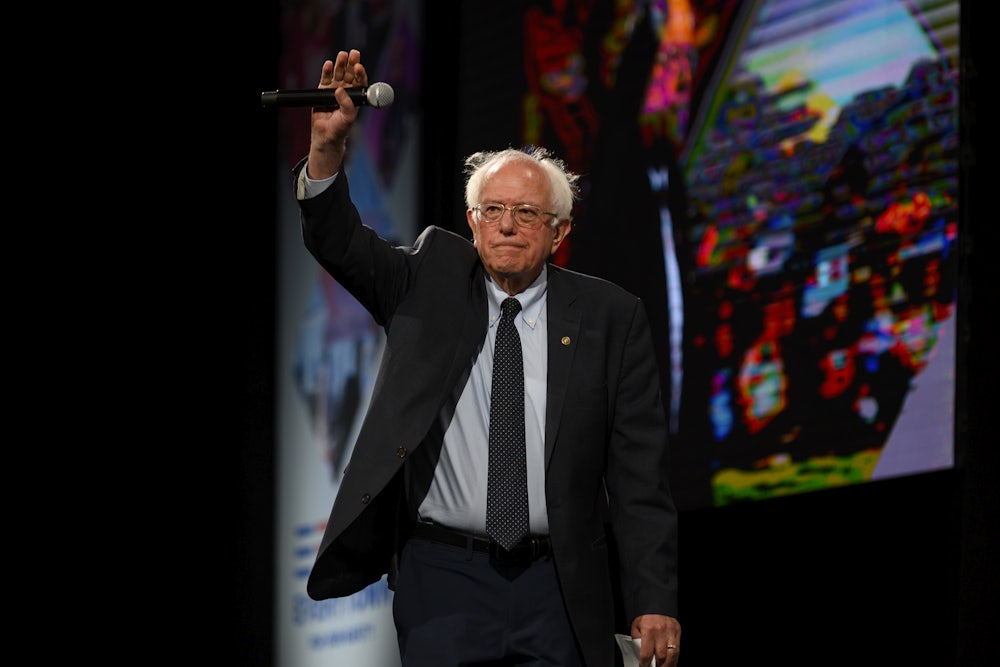The first night of the Democratic National PowerPoint Presentation went off without a major technical hitch. But partly owing to the uncanny nature of this virtual non-event, much of it had a very strange energy. It was highly reminiscent of the “Welcome to America” videos that play at customs when you return to the United States from abroad and steel yourself for interrogation by a border patrol agent: Overly saccharine, riven with a hollow and superficial sort of patriotism, simultaneously overproduced and deeply unimpressive.
But it was an optimistic tone that suited the nostalgic reassurances that characterized Joe Biden’s rhetoric during the primary campaign, which have persisted even into the terror of the pandemic. For the showrunners behind this Zoom Convention, it is a tricky line to walk: Address the pandemic, the 170,000 dead and the chaos unfolding, without undercutting Biden’s Good Vibes Only approach. It felt as if the party wanted the viewer to be mad, but not too mad. This led to some occasions of tonal whiplash. An hour in, there was a segment that memorialized those who have died from Covid-19. Such remembrances have been conspicuously absent from our civic life; it was the first moment of the proceedings that truly nailed the gravity of what has happened. But this only made the strained optimism of the rest of the evening all the more jarring. Where was the anger for these dead an hour before? Why wasn’t anyone shouting?
Even the man we’ve come to rely on to yell about the state of things was somewhat subdued. After an array of Republicans spoke, Bernie Sanders gave his short address—there’s that whiplash again—from his home in Vermont. Earlier in the day, The New York Times previewed Sanders’ moment in the spotlight as a kind of “victory speech,” since “so many within the party have embraced at least the spirit of his ideas.” The speech certainly could have been read as a kind of victory lap, a reminder of the policy areas in which his campaign and movement has pushed the Democratic Party to the left; it’s doubtful that Biden would have endorsed a $15 minimum wage if Sanders hadn’t run on it in 2016, for example. Sanders was also the first speaker of the night to mention the $600 in extra unemployment benefits that Democrats fought to win in the CARES Act, and which expired at the end of July.
You could see what the Times meant about the moment being a “victory speech” in the methodical way Sanders outlined some of the bolder ideas that Biden has promised to embrace. This was the responsibility that was entrusted to Sanders alone. Where most of the other speakers who offered their testimonials in the hundred or so minutes that preceded his appearance offered platitudes and attitude, Sanders wove a dense discussion of policy into his critique of the Trump presidency. It was the necessary bridge between the last two contenders standing at the end of the primary. Voters who picked Biden didn’t do so because they liked his policies better than everyone else’s; they did so because they believed him to be the safe choice. Sanders supporters, on the other hand, were signed up for a movement with an intuitive, broad message; it was a diagnosis of a deep rot in American society and, at last, the promise of an adequate cure. This was a moment that made sense, politically: To reconcile the two camps, Sanders needed to offer a convincing case that Biden understood the stakes and the scope of what needs to be done to bring America back from this horrific crisis.
But even in Sanders’s short speech, you could also see the limits of this strategy. Sanders mentioned that Biden would lower the Medicare age from 65 to 60, but omitted mention of Biden’s ramshackle public option plan. He talked about Biden’s promise to tackle climate change—but not to pass a Green New Deal. More to the point, however, the promise of a just recovery is meaningless without an understanding that the backslapping, across-the-aisle dealmaking these two senators are so familiar with will not be sufficient to the task of extricating the country from this dreadful situation, a fact that Biden and his advisers often seem not to grasp. The fact that the restoration of the $600 unemployment benefit that’s such an urgent need in this crisis was only mentioned in passing by Sanders, on a night in which Democrats very consciously attempted to put ordinary Americans at the center of the convention, speaks to the lack of urgency the rest of the party feels about preserving one of the biggest policy wins the party has had in years.
Sanders’s speech was a reminder that we are better off when there is immense pressure from the left on candidates like Biden, and that such pressure can in fact create change, over years and years of work. But it was also a reminder that the left lost in 2020—and when you lose, you don’t get to set the agenda. The Sanders wing may end up at the table; they might yet collaborate, as Sanders’s endorsement suggested. But it’s Joe’s party now.
